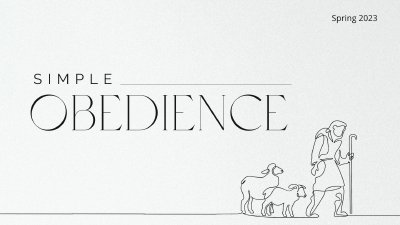Matthew 16:1-12 Sermon Information
Series: Simple Obedience
Title: “Simple Faith in the Risen Christ”
The Pharisees’ and Sadducees’ request (16:1) - "Give us a sign”
The irony is that Jesus had been doing many signs and wonders, proving that he is the Messiah (see Matt 14:13-21; 15:29-39)
The religious leaders did not want a sign in order to believe, but to accuse Jesus
Jesus’ response (16:2-4) – “Discern the times”
The sign of Jonah – repeated from 12:38-42
Jesus’ resurrection would serve as the ultimate sign of his identity and validate his teaching
The testimony of Jesus’ Person and Work are sufficient for saving faith
Q: What motivates our tendency to desire signs in order to trust God in our lives?
The disciples’ dilemma (16:5) – “We forgot bread”
Jesus’ warning (16:6) – “Watch and beware of the leaven of the Pharisees and Sadducees”
It only took a small amount of leaven to affect the whole dough (see Matt 13:33)
There was a much greater danger than the lack of basic needs
“leaven” = unbelief; self-righteousness = rejection of Jesus
Unyoked-ness to Christ
The disciples’ confusion (16:7) – “No bread = No leaven”
Jesus’ rebuke (16:8-11)
Scarcity is not the issue; unbelief is the issue
The disciples had become preoccupied with earthly matters (see Colossians 3:1-3)
The disciples’ understand (16:12)
Jesus is firm, yet patient, as he helps the disciples see through the temporal to the spiritual
Rejoice that we have God’s Spirit to lead us into truth (John 16:13; Acts 1:8; 1 Cor 2:10-16)
Main Point:
Preoccupation with our own welfare (Will God provide?) often causes us to lose sight of God’s kingdom.
Jesus had already taught the disciples that:
He came to provide righteousness (5:17-18)
God is their Father, who knows their needs and cares for them (6:8, 32)
They were to pray for “daily bread,” trusting God for their provision (6:11)
They were not to be anxious about their necessities (6:25-34)
The parable of the Sower (Matthew 13:1-23, 22)
When we are fixated on God’s Kingdom (Matt 6:33) we will not be preoccupied with temporary concerns
Question: Are you building your life in such a way that you don’t need God?
Such a life may be marked by a sense of security but void of glory and any lasting treasure (Matthew 6:19-21, 24; 1 John 2:15-17)
The Pharisees, Sadducees, and scribes didn’t need Jesus because they had their law (and their enhancement of the law – fences)
God hasn’t asked us to build fences for our security but to enter into Christ by faith and remain in by faith, through our connection with his body in community
“Therefore, when a proud wit and supernatural knowledge revealed meet together, the proud heart storms and loves to struggle, and devise this thing and that thing to commend itself; and hereupon comes heresies, the mingling of natural wit with divine truths.” (Richard Sibbes, A Glance of Heaven, Works, vol. 4, pp. 156-59)
Discussion Questions:
Where are you prone to become preoccupied with the temporal matters of life and lose sight of the eternally significant matters of God’s Kingdom?
Where are you most prone to distrust God’s provision?
How does genuine faith that God is our Father who knows our needs and promises his provision free us to “seek first [God’s] kingdom and righteousness”?
Are you building your life in such a way that you don’t need God? Does anything need to be rearranged (repented of)?
How does your involvement in Christian community protect and nurture your faith? How does neglect of community put you in spiritual danger?
Read the following passages and rejoice at God’s abundant provision:
John 1:1-16; Romans 3:19-21; 2 Corinthians 5:11-21; Colossians 1-2; Hebrews 10:1-16; 1 John 1:1-2:14
Confess any areas of fear, worry, unbelief
Write down any ways you are prone to earn or achieve righteousness on your own





